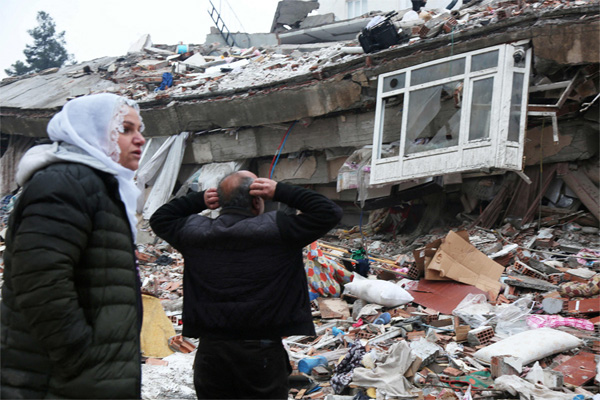Wednesday, February 8, 2023

The powerful earthquakes that shook Turkey and Syria this week are among the most devastating and deadliest quakes in recent history.
The death toll surpassed 9, 400 across the two countries on Tuesday, and officials said the numbers would likely rise.
Three devastating quakes – of 7.8, 7.6 and 6.0 – hit Turkey’s southern regions on Monday causing widespread destruction in Turkey and in neighbouring Syria.
Two more temblors struck the country on Tuesday. There have been many aftershocks as well.
Scores of violent aftershocks followed both quakes and continued into Tuesday
More than 6,000 buildings were toppled. In addition to the climbing death toll, tens of thousands of injuries have been reported.
Rescue workers from around the world were on the ground Tuesday searching through debris for signs of life – but amid the widespread damage, relief still struggled to reach some devastated towns.
Turkish President Recep Tayyip Erdogan said 13 million of the country’s 85 million people were affected, and he declared a state of emergency in 10 provinces.
Deadliest earthquakes in recent history
Hundreds of thousands of people have died in major earthquakes over the past two decades alone.
Here are some of the deadliest earthquakes the world has seen in the past 25 years, according to a news media and the U.S. Geological Survey:
June 2022 in Afghanistan: More than 1,100 people died in a magnitude 6.1 earthquake.
August 2021 in Haiti: More than 2,200 people were killed in a magnitude 7.2 earthquake.
September 2018 in Indonesia: A magnitude 7.5 earthquake triggered a tsunami, killing more than 4,300 people.
April 2015 in Nepal: A magnitude 7.8 earthquakes killed more than 8,800 people.
March 2011 in Japan: A magnitude 9.0 earthquake triggered a tsunami, killing nearly 20,000 people.
January 2010 in Haiti: A magnitude 7.0 quake killed hundreds of thousands of people.
Estimates for the death toll range significantly. The United Nations says about 220,000 people were killed, while the Haitian government estimates put the number at a staggering 316,000 dead.
May 2008 in China: A magnitude 7.9 quake killed more than 87,500 people.
May 2006 in Indonesia: More than 5,700 people died from a magnitude 6.3 quake.
October 2005 in Pakistan: A magnitude 7.6 earthquake killed more than 80,000 people.
March 2005 in Indonesia: About 1,300 people died from a magnitude 8.6 quake.
December 2004 in Indonesia: A magnitude 9.1 quake triggered an Indian Ocean tsunami, which killed about 230,000 people in a dozen countries.
December 2003 in Iran: More than 20,000 people died from a magnitude 6.6 earthquake.
May 2003 in Algeria: A magnitude 6.8 earthquake killed more than 2,200 people.
January 2001 in India: A magnitude 7.6 quake killed as many as 20,000 people.
August 1999 in Turkey: 18,000 people died from a magnitude 7.6 earthquake.
May 1998 in Afghanistan: A magnitude 6.6 earthquake killed more than 4,000 people.
Worst earthquake ever recorded
Of course, it’s difficult to pinpoint the “worst” earthquake in history, because the strength of temblors – as well as damage, death tolls and devastation to communities – ranges significantly.
The most powerful earthquake that has been instrumentally reported was a magnitude 9.5 quake in Chile in 1960.
Also known as the Valdivia earthquake, the quake generated a tsunami that was destructive not only along the coast of Chile, but also across the Pacific in Hawaii, Japan, and the Philippines, according to NOAA’s National Centers for Environmental Information.
Estimates for the death toll associated with both the Valdivia earthquake and tsunami range from 490 to 5,700, NOAA says, and 3,000 people were reported injured.
The Chilean government estimated that 2 million people were left homeless and more than 58,000 homes were destroyed.
Have Turkey and Syria seen deadly earthquakes before?
Monday’s magnitude 7.8 earthquake occurred in the East Anatolian fault zone, a seismically active area that has produced damaging earthquakes in the past.
Almost all of Turkey is really seismically active, Eric Sandvol, a seismologist at the University of Missouri, told a media. This is not something new to the country.
Just over three years ago, in January 2020, Turkey was struck by a magnitude 6.7 earthquake that caused significant damage.
And in 1999, a devastating magnitude 7.4 quake near Izmit on the North Anatolian fault system killed an estimated 18,000 people.
Tags: earthquake, Syria, Turkey
Thursday, April 25, 2024
Wednesday, April 24, 2024